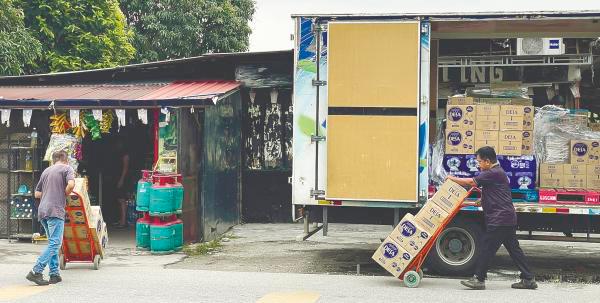PETALING JAYA: A food safety consultant has warned the public to beware the next time they drink bottled water as it could be contaminated.
Mohd Nur ‘Azim Shahuddin said bottled water kept in vehicles and stored in shops could be susceptible to chemical leaching, microbial growth and degradation of taste and mineral content.
“This is especially so with the current heatwave, which may increase the risk of chemical leaching from plastic bottles that are commonly used to hold water.
“Potential health risks could include cholera, diarrhoea, dysentery, hepatitis A and typhoid.”
Nur ‘Azim also said bottled water transported in lorries is usually packed in cartons to protect it from direct sunlight but those packed in plastic wrapping should be transported in closed container lorries and not canvas-covered ones.
“This will ensure transporters maintain the integrity and quality of bottled water during transit, so safe and satisfactory products are delivered to consumers,” he said, adding that the ideal temperature for storing bottled water is between 20°C and 24°C to maintain its quality and safety, prevent plastic degradation and reduce the risk of chemical leaching.
“Also, storing bottled water in the refrigerator is a common practice and generally recommended to maintain its freshness. However, temperature fluctuations when storing plastic bottles in the refrigerator increase the leaching of chemicals such as antimony and others into the water.
“While the amount of antimony leached is generally safe according to regulatory standards, repeated refrigeration and room temperature transitions will increase the risk of such leaching.”
Nur ‘Azim suggested consumers use glass or stainless steel bottles for long-term refrigeration since the former is non-chemical reactive while the latter is “less prone” to chemical leaching.
Universiti Putra Malaysia Faculty of Food Science and Technology researcher Naziruddin Mat Ariffin said exposure to direct sunlight of between 32°C and 40°C should be avoided.
“This is because such temperatures could promote the growth of microorganisms such as algae and bacteria, which deteriorate the quality of bottled water.”
He said the prolonged exposure of UV radiation to the polymeric material in plastic bottles, including polyethylene terephthalate bottles, which are used to pack bottled water, makes it susceptible to photochemical ageing.
“The leaching of chemicals from these bottles can worsen with higher water temperatures caused by exposure to sunlight. The public and retailers are advised to ensure proper storage of bottled water to minimise the risk of contamination.”
He said storage temperature and duration directly affect the rate of chemical leaching from the plastic bottles into the water and pose a major health concern.
“Studies confirmed the leaching rate rises in tandem with the increase in temperature. Similarly, a longer storage duration will result in higher levels of chemical leaching,” he said, adding that the Malaysian Food Regulations 1985 does not require manufacturers to include an expiry date on bottled water.
“However, in 1987, New Jersey in the US introduced legislation mandating bottled water must carry an expiry date of less than two years from the manufacturing date.
“This has since become an unofficial standard for manufacturers. But consumers must continue to remain vigilant for any strange smell, metallic taste, foam, unusual cloudiness or colour change in bottled water as these could indicate the presence of microorganisms.”
He said while consuming bottled water beyond its expiration date is generally safe, adhering to the recommended shelf life is advised to minimise potential risks.









